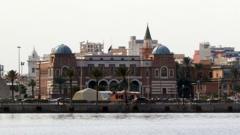Libya’s central bank (CBL) says it has resumed operations following the release of a bank official who had been abducted from his home.
CBL confirmed the release of Musaab Muslamm, head of the bank’s information technology department, who was taken on Sunday by an “unidentified party.”
It said Mr Msallem had been taken from the capital, Tripoli, and that other bank employees had been threatened with kidnapping too.
CBL had halted all work, refusing to reopen until Mr Msallem was freed.
In a brief statement on Monday afternoon, the bank said it was back running as normal as Mr Msallem had returned and was “safe”.
The central bank, which is independent but owned by the Libyan state, is the only internationally recognised depository for Libyan oil revenues – a vital economic income for a country torn for years between two rival governments in Tripoli and Benghazi.
Mr Msallem’s abduction comes a week after the central bank suffered a siege by armed men, according to AFP news agency.
According to local media cited by AFP, the armed men did so to force the resignation of the bank’s governor Seddik al-Kabir.
In office since 2012, Mr Kabir has faced criticism over the management of oil resources and the state budget.
On Monday, Mr Kabir discussed “the increasing threats to the security and safety of the central bank, its employees and its systems” with British ambassador to Libya Martin Longden, CBL said in a statement on Monday.
Since the ousting and killing of Libyan leader Muammar Gaddafi in 2011, the country has suffered from chronic insecurity.
The country has been divided by power struggles and currently has two governments – a UN-recognised one based in Tripoli, and another in the country’s east backed by warlord Gen Khalifa Haftar.
Go to BBCAfrica.com, external for more news from the African continent.
Follow us on Twitter @BBCAfrica, external, on Facebook at BBC Africa, external or on Instagram at bbcafrica, external

